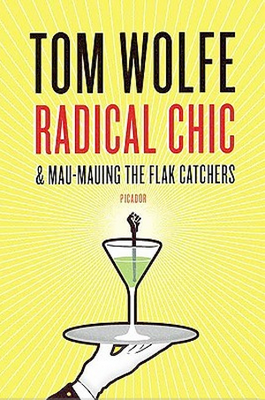Radical Chic & Mau-Mauing the Flak Catchers

Radical Chic, noun: a small clique of the New York upper elite who, in order to appear groundbreakingly fashionable, support social movements and causes which ironically are at odds with the morays inherent to their identity
Mau-mau, verb: to stubbornly and meticulously badger someone into supporting a cause; to petition while using one’s minority identity in such a way that a member of a majority is left without rebuttal
Flak Catcher, noun: poorly paid and hardly respected public officials who are often used as human shields to protect their bosses from mau-mauing (see definition)
Beginning Tom Wolfe’s collection of two essays Radical Chic & Mau-Mauing the Flak Catchers, I admit I knew very little. Who or what was the radical chic? What was mau-mauing? Why were flak catchers on catching end? A child born long after the '60s, I had little beyond a layperson’s knowledge of Wolfe’s other eccentrically long titles—something involving Kool-Aid, acid, and some sort of test.
Upon concluding the book, I’m happy to admit that I now know infinitely more, not only about the kooky title, but also about race relations in the 1960s, the Black Panther movement, and the infamous evening that brought the hypocrisy of the highest New York socialites to the nation’s attention. With a constantly tongue-in-cheek tone, Wolfe walks the reader through the dinner party hosted by Leonard and Felicia Bernstein in 1970 in his essay “Radical Chic” and through the methods employed by minority groups to petition the local government of San Francisco in “Mau-Mauing the Flak Catchers.” On both coasts and with two different populations, Wolfe holds up a mirror to the duplicity, irony, and hilarity of race relations.
I couldn’t help laughing as Wolfe aptly described the wonderfully humorous scenarios: Roquefort cheese balls served to dinner guests in black leather, rich Jewish party-goers writing checks for an anti-Semitic organization, minority leaders protesting against a white government for their failure to follow through, then failing to follow through with their own protests. Wolfe’s style is disarming and feels truthful, as if he’s the only person who sees each situation for what it actually is, and the actions, desires, and blind spots he reveals in people of every ethnicity serve to both humble and unite them.
Both essays were highly enjoyable, and as someone far removed from the 1960s, New York, and San Francisco, I can only imagine they would be even more interesting to someone with firsthand knowledge of those locales during this time period. Although the book was essentially about how people tried to deal with difference, I turned the last page feeling more akin to each person’s fumbling portrayal regardless of race. The best part of Wolfe’s writing is the recognition that he himself is part radical chic, part mau-mauer, and part flak-catcher. We all are, to varying degrees, and as long as there is a satirist to expose our foibles and peccadilloes, we should keep hosting parties to provide hilarity for the audiences of the following decades.
Actually, Anon, I'm not. I'm a grassroots organizer and freelance writer who is frequently accused of being an academic when people don't like what I say or how I choose to say it.
"M said...
Your comment was superfluous to this review, Lawrence, as Melissa chronologically positions the book just fine in the review. The addition grates on my nerves because it comes across as a man unnecessarily undermining a woman."bizarre reaction to a mildly pedantic comment. you must be an academic, eh?
Then I stand corrected, and once again, I apologize for any misunderstandings. Lawrence
Seems to me if questions are what you intend, questions are what you should ask. Making statements as if to inform the reviewer of something she may already know just seems petty. I agree it's important to question why this book is reissued, for example, but I would have been offended if I received a comment in this manner from a fellow writer.
-an FR writer (who perhaps for obvious reasons, will remain nameless)
Thanks M., for your comment, and once again, thanks, Melissa, for your review. I've read and re-read my words, and try as I might, I can't see as what I wrote as having attempted to undermine anyone, certainly not the reviewer. I think it's relevant to ask why the book has been reissued, why this book by Tom Wolfe, no less, has been reissued, especially given recent historical events and social movements. If I offended, I apologize, and sincerely so, but my point was completely otherwise; I think it's important that we know why books are published and reissued. There's not a single other thing I'd change about the review, which I thought was quite good, and it made me remember a book I'd forgotten long ago.
Cheers.
Lawrence Hammar
Your comment was superfluous to this review, Lawrence, as Melissa chronologically positions the book just fine in the review. The addition grates on my nerves because it comes across as a man unnecessarily undermining a woman.
Thanks for your review, Melissa. You may find it useful to know that the book was originally published almost four decades ago. This is a reissue. Cheers.
Lawrence Hammar